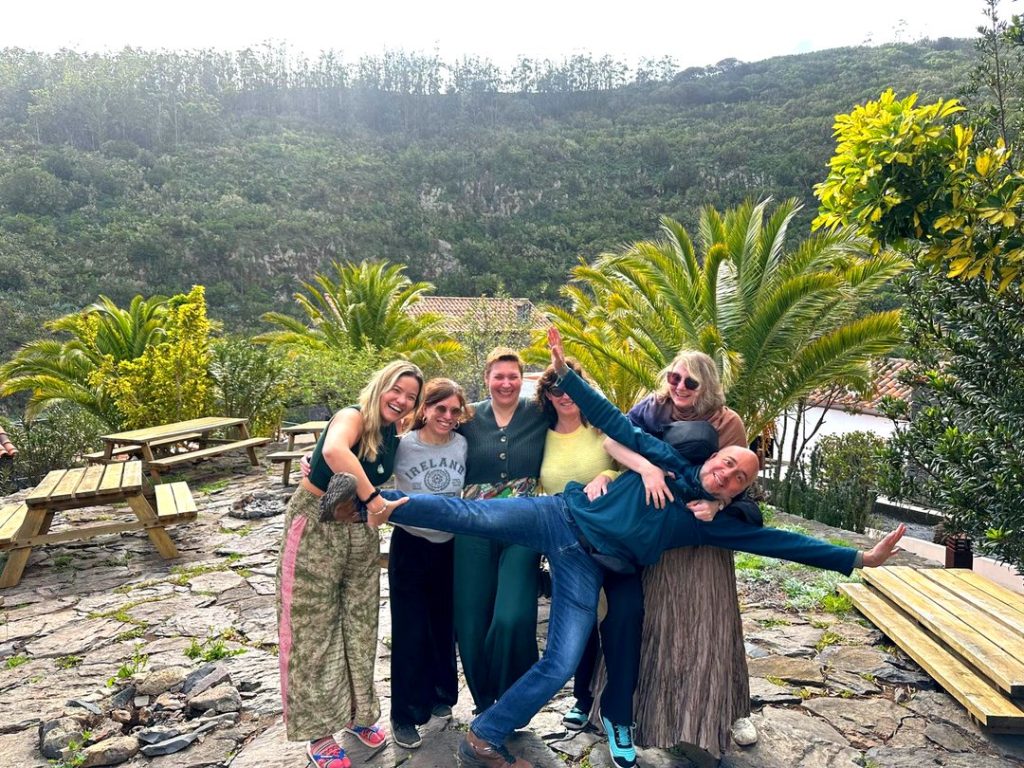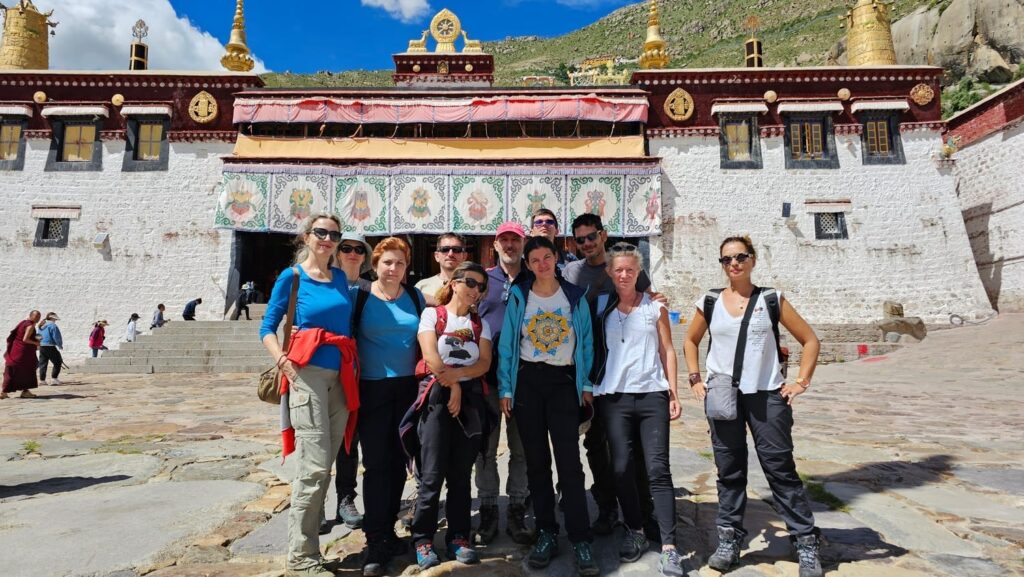So, You Think You Need to “Work On” Being a Better Person? Think Again.
Let’s talk about those amazing qualities we all admire in others—and wish we had more of ourselves. You know the ones: kindness, generosity, confidence… the good stuff. But we’re going to flip the script on how you think about them. Forget everything you’ve heard about “developing” these qualities from zero, as if you were an empty cup that needs filling.
Here’s a wild thought: You were born with all of them. Yep, every single one. They are part of your spiritual DNA, your birthright. It’s not something you need to learn, but something you need to uncover. Imagine it less like building a new house and more like decluttering a beautiful room that’s been buried under junk for years. The room has always been there; you just need to clear the way to see it again. ✨
So, if we’re all born with these awesome traits, why does it often feel like they’re missing? Well, life happens. Society, with its endless rules, expectations, and judgments, creates a kind of “bad spirit” or a distorted version of each quality. From a shamanic perspective, these “spirits” are clever tricksters. They take something pure, like kindness, and twist it into a mechanical duty—something you do to get social approval or avoid conflict. This twisted version traps us, making our actions stem from fear instead of genuine feeling.
To really get what true kindness is, we need to see what it’s not. To feel real confidence, we have to recognize its fake, fragile twin. That’s why, for each quality, we’ll look at both sides of the coin: its Dharma (its pure, natural expression) and the social deviation that messes it all up. This isn’t about trying harder to be “good.” It’s about cleaning your perception. Once you clear away the distortions, these qualities will start bubbling up on their own—spontaneously, joyfully, and straight from the heart.
1. Kindness: What if It’s Not About Being a “Nice Guy”?
When someone says “practice kindness,” what comes to mind? Probably some guided meditation telling you to send loving thoughts to someone, right? It’s a sweet idea, but it only shows half the picture. The mind learns through contrast, not just one-sided, feel-good instructions. To truly understand kindness, we have to get real about what it has become for most of us: a mechanical performance.
Behind the pure energy of kindness, there’s often a “bad spirit” lurking: the spirit of forced kindness. This is the deviation that tricks us. It’s the version of kindness born from a fear of what others will think. It’s that social pressure to always be pleasant, agreeable, and nice. Ever been to a place where everyone is super polite, but you can just feel the tension under the surface? That’s not real kindness; it’s a social ritual, a defense mechanism to avoid criticism. 😬
This deviation traps us in the “nice guy” or “nice girl” role. When we play this part, we start giving away our personal power. We choose being seen as sweet and soft over being our wild, authentic selves. We bite our tongues and swallow our truth because we’re scared of making waves. But what is true kindness, then?
It’s not about being mechanically sweet. True kindness is spontaneous. It erupts from your heart as a genuine wish for the well-being of others and yourself. It’s not an act you put on to avoid judgment; it’s an authentic expression of love.
And here’s the game-changer: the outward expression of true kindness isn’t always gentle. Sometimes, the kindest thing you can do is be a little rough. It might mean being direct, setting a firm boundary, or having an honest conversation that feels uncomfortable. Think about a relationship where one person is always accommodating to avoid fights. That “soft” kindness prevents any real issues from being resolved, leading the relationship straight to hell. The truly kind act might have been a tough, honest talk that looked anything but “nice” in the moment.
The secret to this higher kindness is seeing the true essence of another person—their soul, their highest potential. When you connect with that part of someone, kindness just flows. It’s not a strategy; it’s what happens naturally when your perception is clean and your heart is open. ❤️
2. Generosity: Are You Giving Freely or Just Setting a Trap?
Just like kindness, generosity gets seriously twisted by social programming. We’re taught to focus on the act of giving, but we rarely stop to check the hidden intentions behind it. The most common distortion? Giving with strings attached. This turns a beautiful quality into a sneaky tool for manipulation and control.
Let’s break down the fakes:
- Giving for applause: This is the politician posing for a photo-op at a charity event. The act isn’t about joy; it’s about being seen as a good person. The prize they want is a round of applause from the public.
- Giving out of obligation: You know this one. It’s when you give because you feel you have to, not because you want to. You hand over the money or your time, but inside, you feel resentful and drained. That’s because the act is totally disconnected from your heart.
But the most toxic deviation of all is giving to feel entitled. This is when you shower someone with your time, money, or energy, and a little voice inside starts whispering, “They owe me.” You start feeling entitled to make demands, believing they are now obligated to you. It’s giving in exchange for control. We see it all the time in families, when a parent says, “I gave you everything, and this is how you repay me?” That single sentence turns the unconditional gift of life into a transaction, a debt. 🤢
So, what does pure generosity look like? It works on one simple, beautiful rule: the reward for giving is the feeling you get while giving. That’s it. The reward isn’t what you get back; it’s the buzz of joy in that very moment. Think of a little kid handing you a flower they just picked. They’re not looking for a payback; they’re just sharing a spark of delight.
This feeling of joy is your ultimate bullshit detector. If you give and feel depleted afterward, it’s a red flag that your generosity wasn’t pure. You were probably acting from obligation or a hidden agenda. But when you find that delight in the act of giving? You’re already receiving. The act itself fills you up. True generosity isn’t a sacrifice—it’s an experience of joy. 🎉
3. Confidence: The Solid Core vs. the Fragile Mask
Confidence is probably one of the most misunderstood qualities out there. Its true home is in your solar plexus, your center of personal power, and it’s deeply connected to your innate sense of self-worth. But society has cooked up a powerful and toxic fake version: a “confidence” that isn’t built on inner strength, but on the external validation of others.
This fake confidence is the work of a parasitic personality. To feel good about itself, it needs to make others feel small. Its sense of worth isn’t generated from within; it’s stolen from the energy of people around it. This is the person who gets aggressive, attacks others, or humiliates them in public just to get a quick hit of superiority. This behavior is a flashing red light for a broken sense of confidence. Because they feel worthless deep down, they build a mask of arrogance and try to drag everyone else down with them.
So many people live their whole lives protecting this fragile mask. They build a comfort zone—a job, a family, a social circle—where they feel safe and valued. But the moment you take them out of that environment, their confidence shatters. I’ve been there. When I moved to a new country, I was totally out of my element, and my sense of value took a nosedive. It was a clear sign that my confidence wasn’t solid yet; it depended on my surroundings and the roles I played.
True confidence is the complete opposite. It’s a rock-solid sense of your own value that comes directly from your soul. It has nothing to do with your job, your bank account, or what people think of you. You could be broke, dirty, or in a totally awkward situation, and you would never lose touch with your intrinsic worth. You have zero doubt about the value of your being. This is what Jesus was getting at when he said, “I am the son of God, and you are too.” He was pointing to the highest value imaginable—one that’s baked into all of us, not earned.
So, how do you get this real-deal confidence? You can’t build it by stacking up achievements. The only way is to embrace challenges. A challenge is any situation that rattles your current sense of value. The deep fear behind avoiding them is that you’ll fail, and that failure will expose you as worthless. My biggest fear was always that people would see right through me and find nothing there.
But it’s by facing those exact situations that you build the real thing. You have to willingly step out of your comfort zone. In this world, one of the best ways to work on this is through the energy of money, because it instantly shows you how much value you feel you have. How much do you charge for your work? How comfortable are you asking for what you’re worth? These aren’t just business questions; they are deep spiritual practices that force you to connect with that unshakable value within. 💪
4. Trust: Are You Surrendering or Just Trying to Control Everything?
Of all the qualities we’re born with, trust might be the one most twisted by our modern world. Society drills a deeply flawed idea into us: that the only way to feel trust is to control every little thing. This is the great deviation, the “bad spirit” that promises security but only delivers a lifetime of stress.
This messed-up version of trust is based on the idea that if we can just manage our job, our partner, our finances, and our future, then we can finally relax and feel safe. So, we create rigid plans, build strict routines, and try to make every part of life predictable. When everything is going according to plan, we might feel a temporary, artificial sense of trust. But it’s incredibly fragile.
Why? Because this control is a complete illusion. Life is, by its very nature, unpredictable. The moment something unexpected happens—a job loss, a breakup, an illness—our carefully built world of control shatters, and our so-called trust vanishes with it. This constant effort to micromanage life is exhausting. It keeps us in a state of perpetual stress and anger because, deep down, we know our grip is weak. We can’t build real trust this way; we can only build a prison of anxiety.
True trust has nothing to do with control. In fact, it’s the exact opposite: it’s the willingness to surrender. It’s the deep, unshakable feeling that life will always bring you what you need for your evolution. It’s being open to receiving whatever comes your way—the good, the bad, the painful, and the beautiful. It’s a profound faith in a higher wisdom, in the meaning of life itself. It’s knowing that behind every single experience, no matter how chaotic it seems, there is a purpose and there is love.
This kind of trust lets you feel calm and safe without needing to have all your ducks in a row. It’s the feeling of being held. For me, the ultimate test of this was in an Ayahuasca ceremony. There, you’re asked to give up 100% of your control—not just over your weekend plans, but over your body, your mind, and your entire experience of reality. You have to surrender completely.
The biggest roadblock to this state is the fear of losing the reality we cling to—our identity, our body, our illusions of stability. We’re terrified of letting go. But we can’t build real trust by holding on tighter. The only way is to practice surrender. It’s by entering a state of letting go that we open the door to a trust that isn’t fragile and artificial, but powerful, deep, and liberating. 🙏
5. Beginner’s Mind: Are You Seeing the World or Just Your Own History?
This next quality, the “Beginner’s Mind,” is all about your perception. It’s the ability to be fresh and new in every single moment, to see the world without the dusty filter of your past experiences and judgments. It’s a state of pure, childlike openness. Sounds lovely, right? 🤩
But it has one huge enemy: the simple declaration, “I know.”
The moment you think “I know,” you’ve slammed the door on the present and locked yourself in the past. This is the biggest trap, especially for people on a spiritual path. Ironically, the ones who are most resistant to new knowledge are often those who think they’re already experts. The first step to real wisdom is admitting you know nothing. Only then can you actually open your mind to what’s possible.
This “knowing” mind doesn’t see reality; it sees your history projected onto reality. For example, a friend makes one mistake, and from that day on, you only see them through the lens of that screw-up. You’re no longer interacting with the person standing in front of you, but with your judgment of their past. This closes off all potential for the future. A beginner’s mind, on the other hand, is innocent. It sees the potential of the future, not the prison of the past. It’s the only way new things—new relationships, new ideas, new breakthroughs—can enter your life.
However, practicing this can bring up a deep vulnerability: the program of comparison. This is the shadow side that pops up when our self-worth isn’t solid. I’ve been there. I’m generally open, but in that openness, I can start to lose my own sense of value. When I see someone who knows more or does something better than me, I start to doubt myself. I lose connection with my own worth.
This is a critical point. The goal isn’t to empty yourself out and just become a copy of someone else. But when our confidence is shaky, that’s what happens. We see excellence in another person and, instead of feeling inspired, we feel small. This triggers a “bad spirit” reaction: the urge to copy. We think, “What they’re doing is better, so I have to do that too.” This isn’t learning; it’s desperately trying to borrow value from outside because we haven’t built it inside ourselves.
If you can’t admire others without feeling like crap about yourself, it’s a clear sign that the comparison program is running your life. The work isn’t to be less open, but to strengthen your own core of self-worth. When you can witness excellence, appreciate it, and still stay connected to your own unique value, that’s when you are truly free to learn. 🌟
6. Non-Judgment: Are You Living Freely or Stuck in a Cage You Built?
This quality, non-judgment, is a big one. It’s connected to the third eye, the Ajna chakra, which is all about how we perceive reality. Its opposite, judgment, comes from a very sneaky and deep desire: the desire to own the truth. When we judge, we grab one tiny piece of our perception, one single angle, and declare it to be the absolute, 100% truth. We try to force the infinite, messy, beautiful flow of life into a tiny, rigid box. And in doing so, we distort reality itself.
This is exactly how we build our fixed personalities, our identities. We make a judgment: “I am Pablo, the engineer,” “I’m the kind one in the family,” or “I’m a victim.” These judgments become the steel bars of a cage we build around ourselves. This is the ultimate trap, the place where the soul starts to suffocate. Your soul wants to be a warrior one day, a playful child the next, then a wise queen, and then a wild dancer. But the judgmental mind has locked it into a single, boring role. ⛓️
To protect this fragile identity, we then use judgment against others. We judge people based on how neatly they fit into our version of the truth. Those who support our identity become our friends; those who challenge it become our enemies. For example, if you’re unconsciously identified with being a victim, you’ll probably judge empowered people as “arrogant” or “cheaters.” You do this to protect your story, because their power is a direct threat to your identity cage.
The key to escaping this prison is one of the most profound spiritual truths you’ll ever encounter: your perception is not the truth; it is a tool. In our everyday world, we see our identity as something fixed that gives us a sense of self. But in its highest form, perception is flexible, something you can pick up and use.
Think of a shamanic practice used by athletes. Before a big rugby match, you might see a team doing a ritual, acting like wild animals. In that moment, they aren’t just pretending. They are aligning their perception with that of an animal, embodying its ferocity, power, and instinct. They are using perception as a tool to win the game. An actor does the same thing, stepping into a different perception to become a character on stage.
True non-judgment is the freedom to do this in your own life. It’s the ability to change your point of view, to melt the rigid identity you’ve created, and to enter a state where you can be anything. One moment, you can be a child, full of wonder. The next, a fish, feeling the flow of the current. Then a queen, feeling empowered. This is the freedom your soul craves. The way to cultivate it is through practices like meditation and shamanic journeys, which are designed to dissolve that fixed point of “you” and let you access the limitless potential you were born with. ✨
7. Patience: Why Your Healing Isn’t a Race (And How to Honor Your Own Pace)
In our modern world, we want everything fast. Fast food, fast internet, and fast results. The ego hates waiting, and this impatience has created a world that’s totally disconnected from the natural rhythms of life. This is the great deviation of patience: the belief that we can speed up our transformation, that we can force our healing to happen on a timeline we control.
This shows up everywhere in the world of self-improvement. You see programs offering a fixed, linear path: “Heal these five wounds in this exact order, and you will be whole.” But that’s not how life actually works. When I look at my own healing, I see that things come up in their own time, at their own speed. You can’t just decide which deep wound will surface first. After more than a decade of this work, wounds from my earliest childhood are only just beginning to show themselves. You have to heal the outer layers before you can even get to the core.
This mechanical, step-by-step approach isn’t designed for real healing; it’s designed to be sold. It preys on our fear and offers a rigid structure that feels safe. But real growth is organic, not mechanical. A lack of patience makes us build new things on top of old, messy foundations, which just guarantees that we’ll repeat the same cycles over and over again. 🔄
True patience is the willingness to respect the cycles of life, just like we see in nature. Life doesn’t move in a straight line; it moves in spirals. There is a time for action and a time for stillness, a time for creating and a time for integrating. Patience is understanding which part of the cycle you’re in and actually honoring it.
Think of the seasons. There’s a time of growth and action, like summer, when everything is happening externally. But then comes autumn, a time of integration. This is when the real work happens inside. You have to reflect on your experiences and let the lessons sink in. To the impatient mind, it feels like nothing is happening, but it’s the most crucial part.
After integration comes winter, a time of emptiness and silence. We often mistake this phase for depression, but it’s a sacred space of contemplation. It’s the fertile ground upon which something new can finally begin to grow. Our impatience makes us fear this emptiness. We rush to start a new project or relationship without having fully integrated the last one, and so we’re doomed to repeat our old mistakes.
These cycles are happening all the time, on every level of our lives. Patience is the wisdom to understand that every phase is necessary. It’s the deep knowing that things unfold at their own speed, in their own time, according to a rhythm far greater than our own will. 🌱
8. Gratitude: The Ultimate Unlock (And the Ego’s Greatest Fear)
We’ve arrived at the highest of all qualities, the key that unlocks the door to a state of prayer itself: gratitude. Because it’s so powerful, its twisted version is equally poisonous. While generosity is the joy of giving, gratitude is the joy of receiving. But our society has become an expert at killing that joy.
The “bad spirit” of gratitude turns it into a weapon of control. It’s the voice of a parent saying, “Look at everything I gave you; you should be grateful.” Here, “gratitude” isn’t an invitation to feel joy; it’s a demand for your energy. It’s used to make you feel small, indebted, and trapped in a toxic power game. Because this manipulative dynamic is so common, many of us instinctively flinch at the very idea of being grateful.
But the most powerful force that kills gratitude comes from within: the ego’s sense of ownership. The ego loves to believe it’s the sole creator of its reality. It wants all the credit for its health, its success, its intelligence. The idea that “I built this,” “I earned this,” or “I made myself who I am” is the ego’s favorite story. This sense of ownership makes true gratitude impossible, because gratitude requires admitting that you are not a self-sufficient, isolated island.
True gratitude is the radical recognition that everything you have is a gift. It’s the direct experience of being in a constant, beautiful relationship with life. Your body, your consciousness, your very breath—it’s all provided. This shatters the ego, which thrives on the sexy idea of being an independent hero. But in reality, we need air, water, food, and other people. We are not alone. 🙏
The ego suffers when it hears this, but your soul is liberated. The path is simple, but not easy:
- First, take time to truly contemplate your blessings—not just the stuff you own, but your health, your creativity, your potential, your freedom.
- Then comes the step that crushes the ego: realize that you didn’t create them. You received them. Your talents, your power, your intelligence—they were given to you.
When you fully recognize that everything is a gift, your heart cracks open. The sense of ownership dissolves. And when there is no owner, there is no isolated self. You realize your life is sustained by a force far greater than your own will. The only sane response is to surrender and say, “Thank you.” This is true gratitude, the highest state of being, where you are not alone, but one with everything. 💖
Your True Self Isn’t Lost. It’s Just Buried.
So, here’s the real takeaway: you don’t need to build a better version of yourself. You just need to excavate the incredible one that’s already there. These eight qualities are not medals to be won or skills to be learned; they are the very music of your soul, waiting for you to finally clear out the noise.
The real work isn’t about adding more layers, but about bravely stripping away everything that isn’t truly you—the fears, the judgments, the roles you’ve been playing for far too long. This is a journey of remembering, of returning to the powerful, authentic, and free person you were always meant to be.
Stop trying to become. Start uncovering. Your most genuine, joyful, and powerful life is waiting just beneath the surface. Are you ready to start digging? ✨







